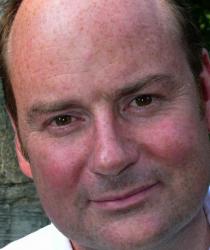
When Eric Schmidt, CEO at Google came to Britain in the summer of 2011, diplomacy was not part of his agenda. Laying into his hosts for “throwing away Britain’s computer heritage”, Schmidt maintained that the UK had “stopped nurturing its polymaths.” It is an argument that finds emphatic endorsement from Charles Cecil, Old Bedalian and leading light of the global interactive entertainment industry. “He was absolutely right,” Charles insists. “Schmidt was actually attacking the Government for allowing computer science, which children always used to love, to degenerate into the awful monstrosity that is ICT, for which they have nothing but contempt. They know more than their teachers a lot of the time, become bored and some of our brightest potential is therefore allowed to go to waste.”
Charles Cecil knows of what he speaks. At Bedales, he had rejoiced in the school’s ability to combine the creative with the mathematical and scientific. “Of course Bedales was more focused on the arts, but there was never any pressure to force you down that track,” he recalls. “The school was very open to whatever you wanted to do and always encouraged you to go about things in a creative way. In my case, my maths teacher had a computer and was happy to teach a bit of off-curriculum BASIC to students, which started the ball rolling.”
At Manchester University to study mechanical engineering, Charles met an electrical engineer, who invited him to write some text adventure games for his newly-formed company. Charles was immediately hooked. “The thing about interactive games is that you have to give players an immediate motivation to want to play them. That can lead to rather stereotypical, formulaic results, if you’re not careful,” he explains. “By thinking creatively about the background and the story, you can achieve amazing results.”
Of course Bedales was more focused on the arts, but there was never any pressure to force you down that track... the school was very open to whatever you wanted to do and always encouraged you to go about things in a creative way
Despite some initial success, Charles was not at first convinced that there was a career to be made out of computer games. “My friend saw the opportunity and left university early. I, on the other hand, couldn’t quite see where this was all going, so I finished my degree before deciding to establish my own company in 1985,” Charles admits. Paragon Programming offered a dynamic new approach to an industry in its infancy, but still faced a few limitations. “It was huge fun, selling our games over the counter and into countries all over Europe,” says Charles with a touch of nostalgia. “It was really only a cottage industry in those days, but the UK was dominating it. From my point of view, the problem was that we were only working for hire at that stage. What I really wanted was to set about creating our own products.”
After a period of working on the publishing side of the computer industry for US Gold and Activision, Charles had gained the all-round expertise he needed to launch Revolution Software in 1990 with three co-founders. Established in Hull, the business would later move to York, and would focus on developing innovative adventure games that broke new technological ground. The company rapidly became the number one market presence in Europe and a leading global player, with titles such as Beneath a Steel Sky and, above all, the phenomenally successful Broken Sword series to its credit.
Revolution Software is very much a modern type of company. Learning from his earlier experiences, Charles no longer has to devote vast quantities of time to administrative and employee issues. “That’s because we don’t actually employ that many people,” he reveals. “We now work mainly on a freelance basis, where it’s much easier to have a relationship of equals and not to use someone if you don’t think they’re any good at what they do. We work with the best of the best in their fields in an atmosphere of mutual respect. On a purely financial level, it also means that we can control our overheads.”
Likewise, Charles’ business model has done away with the plague of the middle man: “We have a pretty good brand, and how we exploit it is the key to our success,” he argues. “Five years ago, a computer game was sold in a box for £20-30 and if people could rip it off, they would. In today’s digital age, we can interact directly with our primary audience, which also happens to be the people who play our games. Traditional marketing is meaningless in this industry and, because digital allows so many different ways of disseminating information and products, retailers and publishers are now virtually redundant and our return for each item that we sell is consequently vastly increased.”
Although he confesses to feeling slightly disloyal for uprooting the business from Hull to York, there is no denying the sense of inspiration that Charles derives from the Roman, Viking and Norman antecedents of his adopted home town. “We’re in the centre of town, overlooking the Minster. On the days that I go for a run, to look up and feel the overpowering effect of those amazing flying buttresses is quite extraordinary,” he enthuses. “Then you have the Merchant Adventurers’ Hall in York, which is a 14th century monument to all the same qualities of pioneering enterprise that we celebrate today and is equally inspiring in its own way. London is important to our industry, naturally, but we’re only two hours away in a train, and it’s good not to live right in the heart of things.”
Named an “industry legend” by Develop magazine in 2006 and created MBE in 2011 for services to the industry, Charles is adamant that the accolade that he values most comes from elsewhere. “What I really enjoy is when people tell me that the games that we develop have changed their lives in some way,” he says. “Perhaps they travelled to Paris because they saw a particular view of the city in one of our games that inspired them; a lot of people reckon that Dan Brown must have played the first Broken Sword game before he wrote The da Vinci Code! The point is that I love it when we influence people positively.”
At long last, Charles Cecil believes, politicians are beginning to catch on to the potential of his industry. “The Government is finally waking up to the fact that we have an important and beneficial voice,” he suggests. “There’s something about British pragmatism that suits computer science, and, despite the tax breaks on offer in countries such as Canada, there’s no reason why we can’t still be a world leader in this field.”
Perhaps Eric Schmidt’s words of warning will prove to have been premature after all.
Charles was interviewed in February 2012 by James Fairweather
Read article on Charles' appointment to the Board of Governors of the BFI
